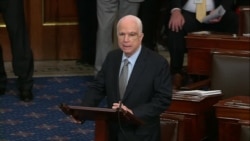The U.S. Senate on Tuesday approved a motion to open debate on a Republican initiative to overhaul the health care system put in place under former President Barack Obama.
The motion passed 51-50, the tie-breaking vote cast by Vice President Mike Pence.
"We don't have to accept it any longer," Senate Republican leader Mitch McConnell of Kentucky said of the current health care law, the Affordable Care Act, on the Senate floor moments before the procedural vote.
McConnell is leading the push to move away from the Affordable Care Act, commonly known as Obamacare, but over the past month he has been forced to retreat when it became clear there were not enough votes to pass either of two Republican versions of the bill.
President Donald Trump was quick to praise the vote. "As this vote shows, inaction is not an option," he said in a statement released by the White House. "And now the legislative process can move forward."
Despite Tuesday's vote, it remains unclear which version of the McConnell effort will put in play. Republican lawmakers have said a less comprehensive version of the latest Senate measure would have the greatest chance of dismantling Obamacare. If the Senate approves a scaled-down version, a House-Senate conference would be arranged to reconcile differences between the two measures.
In a series of tweets Tuesday morning, Trump said Obamacare was "torturing" Americans, and he applauded ailing Senator John McCain of Arizona for returning to Capitol Hill to cast his vote to permit debate on a health care bill.
Republicans hold a 52-48 majority in the Senate. With unified Democratic opposition to repealing the ACA, Republicans could only lose two dissenting votes.
In high drama at the Capitol, McCain voted with the majority Tuesday to move ahead on the debate. The veteran lawmaker, who is battling brain cancer, returned to the Senate floor to plead for the Republicans and Democrats to work together.
"Stop listening to the bombastic loudmouths on the radio, television and internet," he said. "To hell with them. They don't want anything done for the public good. Our incapacity is their livelihood.
McCain: 'Let's Trust Each Other' in Health Care Debate
"Let's trust each other. Let's return to regular order. We've been spinning our wheels on too many important issues because we keep trying to find a way to win without help from across the aisle," he added.
He reminded his colleagues: "Whether or not we are of the same party, we are not the president's subordinates. We are his equal!'' McCain also said he would not vote for the current GOP version of the repeal-and-replace bill.
Lack of clarity
Democratic Senator Al Franken called the lack of clarity about which bill would be considered "deeply troubling."
"This is reckless. This is irresponsible," he said. "The American people deserve better. But let's be clear: A vote for the motion to proceed is a vote to move forward with conceivably any one of these bills, and all of these bills are terrible."
On Monday, Trump had continued pressuring Republicans to act on an issue that was part of his campaign, saying there had been "enough talk and no action."
"Any senator who votes against starting debate is telling America you are fine with the Obamacare nightmare," said Trump, who was surrounded by several families the White House referred to as "victims of Obamacare."
"For Senate Republicans, this is their chance to keep their promise," the president said. "Over and over again they said, ‘Repeal and replace, repeal and replace.’ They can now keep their promise to the American people."
Fresh attacks
Trump also tore into Obama’s health care law with fresh intensity, calling it a "government takeover" of health care and "big, fat, ugly lie" that had "wreaked havoc" on American families.
"They run out and say, ‘Death! Death! Death!' " Trump said, referring to critics of the Republican health care proposals. "Well, Obamacare is death. That’s the one that’s death. And besides that, it’s failing, so you won’t have it anyway."
The ACA has been in place since 2010 and national surveys show Americans view it more favorably than Republican proposals to replace it.
Several Republican lawmakers, despite Trump's campaign vow to upend Obamacare, had announced their opposition to starting debate on the repeal effort, either because they contended that the changes did not go far enough to undermine the law or went too far and would curb health insurance coverage for millions of people, particularly impoverished Americans.
About 20 million people obtained insurance under the law, which prevented insurers from denying coverage to people based on pre-existing medical conditions and required insurers to include a range of medical services in their plans.
During Obama's remaining years in office, Republicans attempted dozens of times to repeal the law and once succeeded in passing repeal legislation, which Obama quickly vetoed. He told Congress that if it sent him something that improved the law or the health system, he would support it.
The nonpartisan Congressional Budget Office has concluded that if Obamacare was repealed without a replacement, 17 million Americans would lose their health insurance next year and 32 million by 2026.
Under a Senate Republican repeal-and-replace proposal, the CBO said 22 million would lose their coverage in the next decade, but the plan would save the government $420 billion.







